Biological, Physiological and Emotional Changes
Investigate how water play facilitates children's development in the outdoor area
28 Pages8185 Words33 Views
Added on 2022-08-14
Biological, Physiological and Emotional Changes
Investigate how water play facilitates children's development in the outdoor area
Added on 2022-08-14
ShareRelated Documents
Running Head: EARLY CHILDHOOD STUDIES
EARLY CHILDHOOD STUDIES
Name of the Student
Name of the university
Author’s note
EARLY CHILDHOOD STUDIES
Name of the Student
Name of the university
Author’s note
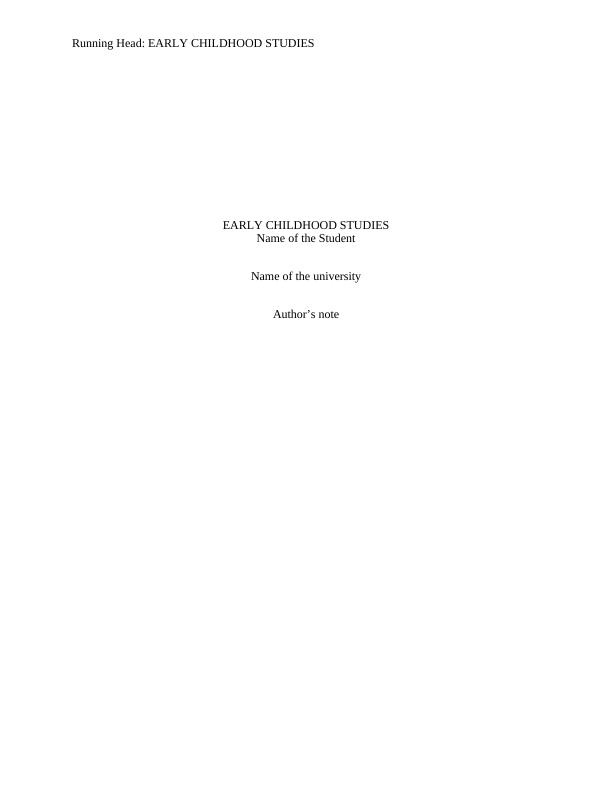
1
EARLY CHILDHOOD STUDIES
Chapter 1
1.1. Introduction
Development in a child involves the biological, physiologicaland the emotional changes that
takes place in human beings since the time of birth and the conclusion of adolescence. Play
provided opportunities for children foe exercising their various capacities in activities that are
spontaneous and are largely self-rewarding and is usually enjoyable (Pellegrini2013). Play can
be defined as a range of activities that is generally done by individuals when they are
intrinsically motivated for getting pleasure from recreation (Goldstein 2012). It has been stated
by psychiatrist Stuart Brown that, “the basis of all art, games, books, sports, movies, fashion,
fun, and wonder – in short, the basis of what we think of as civilization”.
There are different types of play that are important for the development of child such as
unoccupied play, solitary play, onlooker play, parallel play, associative play and cooperative
play. All types of play starting from rough and tumble plays an important role in the
development of the child. Play can be referred to as the lens that allows children to experience
their world and the world of others. If children are deprived of play, they can suffer both
presently and can have long tern effects.
While there are various types of tools for the play, young children can spend countless
hours playing with water, spilling it over, feeling the texture, blocking the stream, making
whirlpools and waves. Playing with water can provide sensory learning experience of immense
proportions. Free play with water can be helpful for building the foundation for the
understanding of a large number of scientific concepts, like concepts of physics (flow and
EARLY CHILDHOOD STUDIES
Chapter 1
1.1. Introduction
Development in a child involves the biological, physiologicaland the emotional changes that
takes place in human beings since the time of birth and the conclusion of adolescence. Play
provided opportunities for children foe exercising their various capacities in activities that are
spontaneous and are largely self-rewarding and is usually enjoyable (Pellegrini2013). Play can
be defined as a range of activities that is generally done by individuals when they are
intrinsically motivated for getting pleasure from recreation (Goldstein 2012). It has been stated
by psychiatrist Stuart Brown that, “the basis of all art, games, books, sports, movies, fashion,
fun, and wonder – in short, the basis of what we think of as civilization”.
There are different types of play that are important for the development of child such as
unoccupied play, solitary play, onlooker play, parallel play, associative play and cooperative
play. All types of play starting from rough and tumble plays an important role in the
development of the child. Play can be referred to as the lens that allows children to experience
their world and the world of others. If children are deprived of play, they can suffer both
presently and can have long tern effects.
While there are various types of tools for the play, young children can spend countless
hours playing with water, spilling it over, feeling the texture, blocking the stream, making
whirlpools and waves. Playing with water can provide sensory learning experience of immense
proportions. Free play with water can be helpful for building the foundation for the
understanding of a large number of scientific concepts, like concepts of physics (flow and
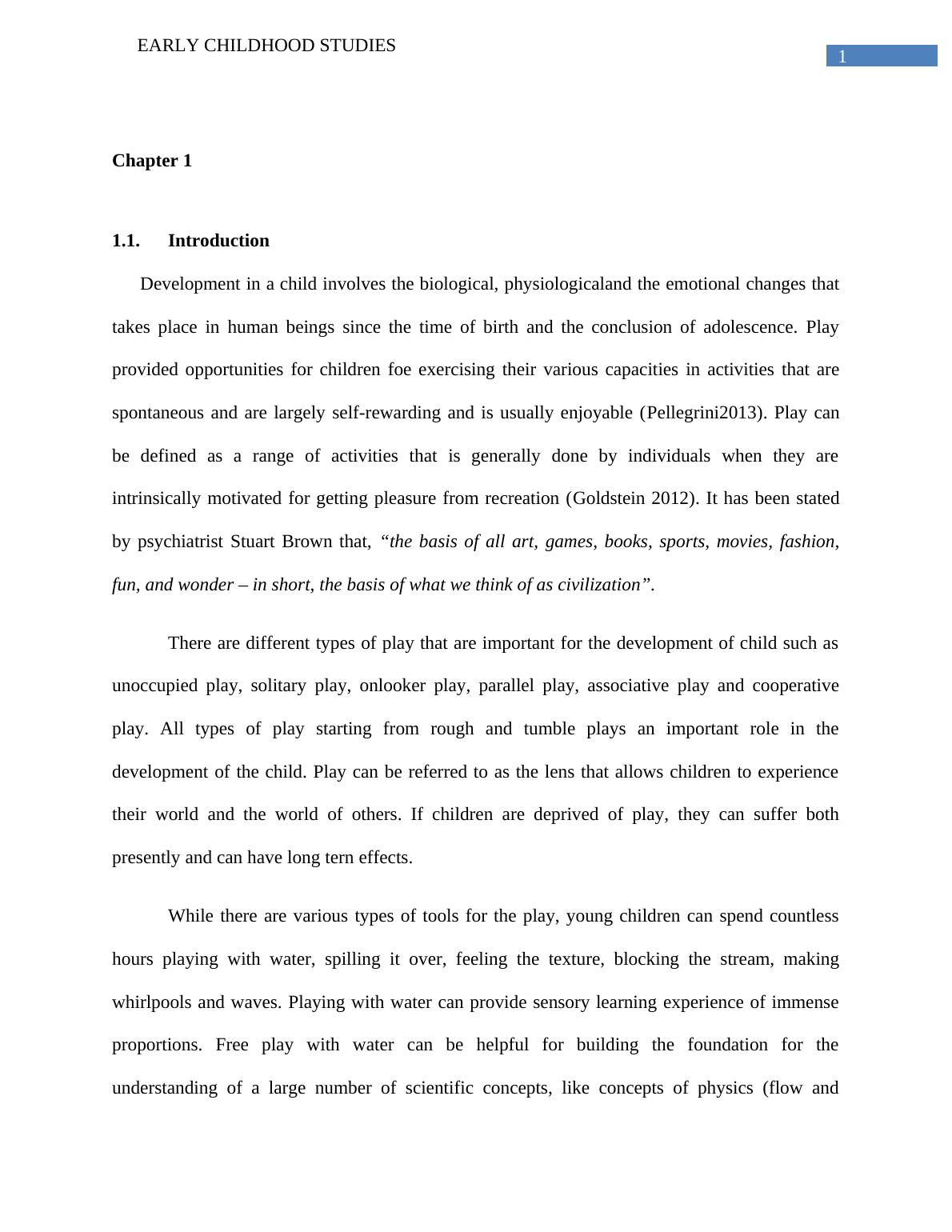
2
EARLY CHILDHOOD STUDIES
motion), chemistry (cohesion ), biology (plants and animal life and mathematics) (Gross, 2012).
It has been stated that mastery over this concepts will support the understanding of the normal
academic subjects in the later life. Children enquire, they observe, complain, explore, design,
create concepts and design experiments and theorize them. This approach of learning has been
used historically, but has always not been recognised to promote learning. It approach has been
used for decades in various “Reggio Emilia” schools in Italy, which are now recognised
worldwide for their inspired approach towards children’s learning (Gross 2012).
While there are several advantages of water play in a child care setting, but there is a lack
of valid evidence based researches based on which some conclusions can be drawn. Even if there
are reviews regarding water play, there is a shortage of primary researches, regarding the positive
effect of water play as an outdoor play in an early childhood setting. Hence, it is not known as of
how children actually react to an organised water play activity. A primary research is important
for the individuals as a researcher will get access to some raw and fresh data for estimating the
conclusion. In order to understand the water and child interaction only via some primary
research, where children might be under observation playing with water. This provides the
rationale for conducting a qualitative research for understanding the role of water play in
facilitating development in children in the outdoor area. Any kind of outdoor play will be
initiated or arranged by the educator. Hence, it is necessary to understand the perception of the
educators about the engagement of the children in the water play.
1.2 Objective
Researches have proved that child initiated activities in outdoor spaces amplify learning
process in children, but no studies could be actually found stating importance of water based
EARLY CHILDHOOD STUDIES
motion), chemistry (cohesion ), biology (plants and animal life and mathematics) (Gross, 2012).
It has been stated that mastery over this concepts will support the understanding of the normal
academic subjects in the later life. Children enquire, they observe, complain, explore, design,
create concepts and design experiments and theorize them. This approach of learning has been
used historically, but has always not been recognised to promote learning. It approach has been
used for decades in various “Reggio Emilia” schools in Italy, which are now recognised
worldwide for their inspired approach towards children’s learning (Gross 2012).
While there are several advantages of water play in a child care setting, but there is a lack
of valid evidence based researches based on which some conclusions can be drawn. Even if there
are reviews regarding water play, there is a shortage of primary researches, regarding the positive
effect of water play as an outdoor play in an early childhood setting. Hence, it is not known as of
how children actually react to an organised water play activity. A primary research is important
for the individuals as a researcher will get access to some raw and fresh data for estimating the
conclusion. In order to understand the water and child interaction only via some primary
research, where children might be under observation playing with water. This provides the
rationale for conducting a qualitative research for understanding the role of water play in
facilitating development in children in the outdoor area. Any kind of outdoor play will be
initiated or arranged by the educator. Hence, it is necessary to understand the perception of the
educators about the engagement of the children in the water play.
1.2 Objective
Researches have proved that child initiated activities in outdoor spaces amplify learning
process in children, but no studies could be actually found stating importance of water based
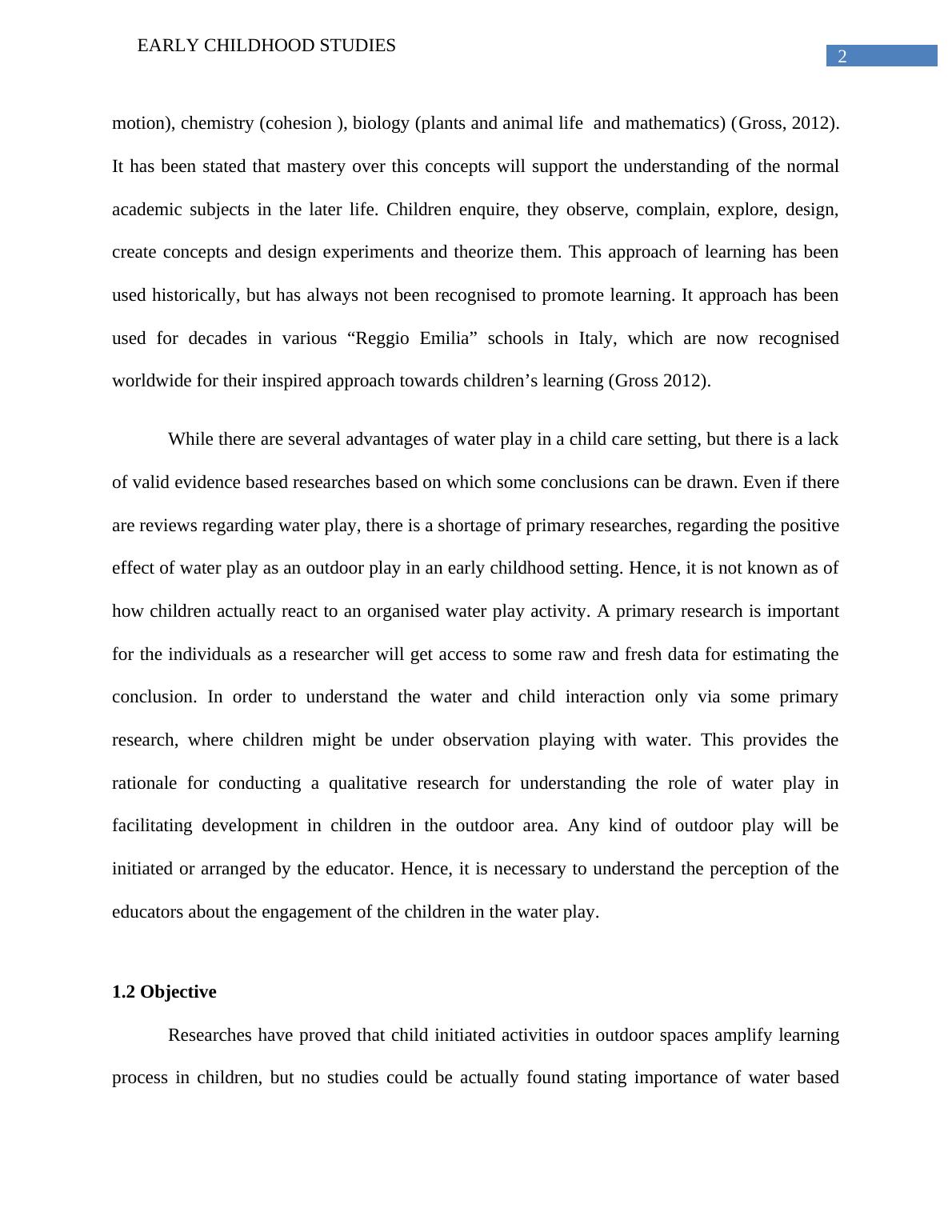
3
EARLY CHILDHOOD STUDIES
activities. Furthermore, no such researches have taken place stating about the perception of the
teachers about water play activities that can be conducted in an early child care setting.
Furthermore, the practitioners can educate the families and can even collaborate with the
educators educating them about the importance of water play. Thus, my research comprised of
three objectives:-
1. To understand the perception of the practitioners about the children’s use
engagement in the water play
2. To identify some of the ways in which children engage in water play in the outdoor
area.
Chapter 2
2.1. Literature review
A wide number of researches have supported the fact that play established neural
connections and hence makes the player more intelligent than the other who does not indulge in
play. According to Play theorist Brian Sutton-Smith, human beings have born with a huge
neuronal capacity which needs to be used. What is acquired through play is the general mindset
towards solving problems that includes abstraction and combinatorial flexibility where the
children stich the bits of behavior to form novel solutions to the problems that require
restructuring of the actions and thoughts. According to Smith, if a child is not stimulated to
explore is surroundings, he might fail to set up those neural connections (Sutton-Smith 1997).
Some of the emotional behavioral benefits ofplay is that play reduced fear, stress and anxiety,
irritability and stress. It creates joy, intimacy self-esteem and mastery. It has been found to be
EARLY CHILDHOOD STUDIES
activities. Furthermore, no such researches have taken place stating about the perception of the
teachers about water play activities that can be conducted in an early child care setting.
Furthermore, the practitioners can educate the families and can even collaborate with the
educators educating them about the importance of water play. Thus, my research comprised of
three objectives:-
1. To understand the perception of the practitioners about the children’s use
engagement in the water play
2. To identify some of the ways in which children engage in water play in the outdoor
area.
Chapter 2
2.1. Literature review
A wide number of researches have supported the fact that play established neural
connections and hence makes the player more intelligent than the other who does not indulge in
play. According to Play theorist Brian Sutton-Smith, human beings have born with a huge
neuronal capacity which needs to be used. What is acquired through play is the general mindset
towards solving problems that includes abstraction and combinatorial flexibility where the
children stich the bits of behavior to form novel solutions to the problems that require
restructuring of the actions and thoughts. According to Smith, if a child is not stimulated to
explore is surroundings, he might fail to set up those neural connections (Sutton-Smith 1997).
Some of the emotional behavioral benefits ofplay is that play reduced fear, stress and anxiety,
irritability and stress. It creates joy, intimacy self-esteem and mastery. It has been found to be
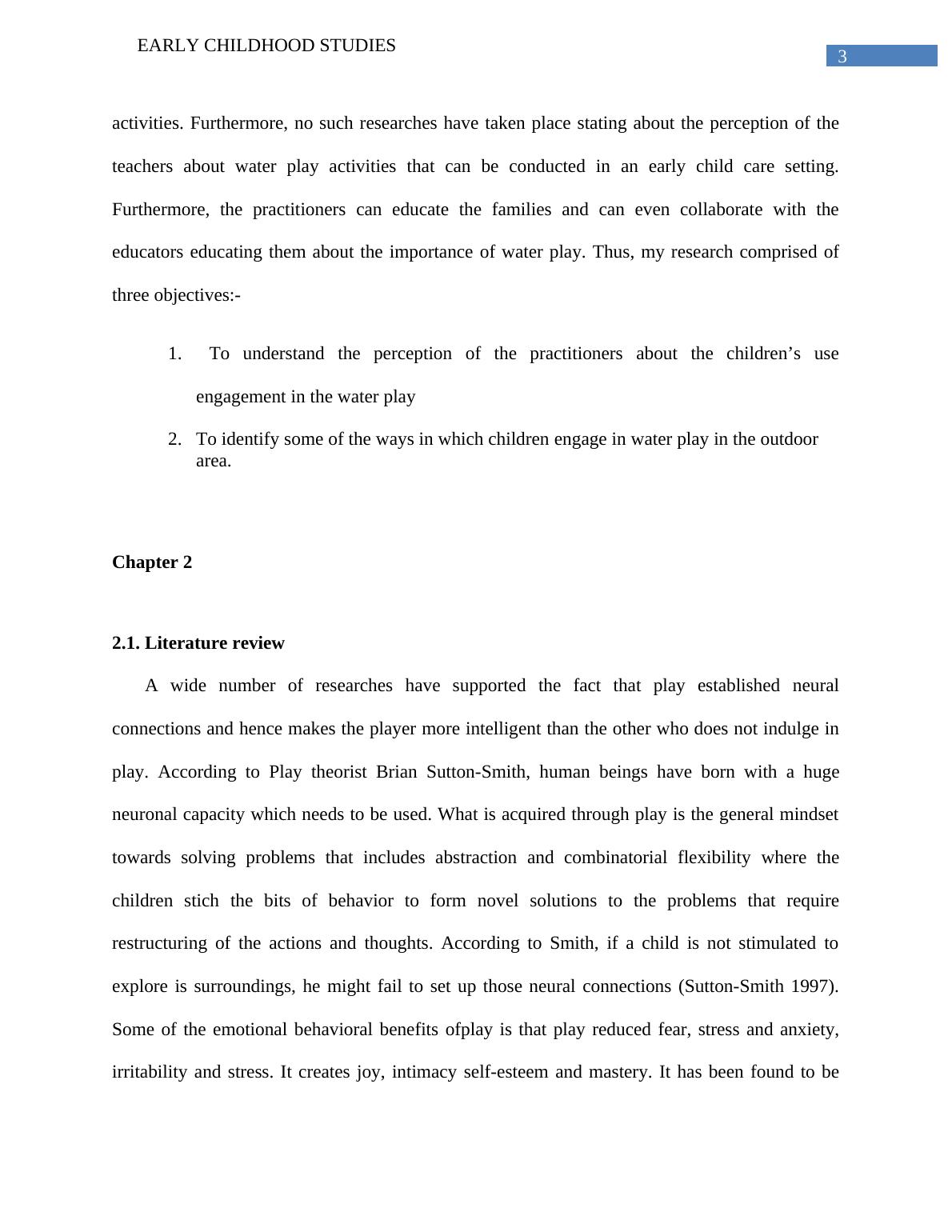
4
EARLY CHILDHOOD STUDIES
improving the emotional stability, resilience, adaptability and the ability to deal with surprise and
changes in the lifestyle (Goldstein 2012).
Types of play
In a guided play, the activity can either be initiated by the chid or the adult, but it is emphasized
that the play that are child directed , the locus of the control is placed with the child (Weisberg,
Hirsh-Pasek, et al. 2013). Children directs their within the established play concepts , whereas
the teachers enhances the learning experience of the children by acting as the commenter,
questioners, co-players or the demonstrators of innovative ways for interacting with the materials
involved (Fisher et al. 2013).
Child initiated play can be considered to the type of play where the children are the
originators and they lead the type of play. It helps them to learn through first hand experience,
permitting them to choose the resources on their own. Adult led play can be considered as the
free time of the play that are organised and has been led by the adult (Weisberg et al. 2013). For
example, the activities set by the games teachers. This sort of play is often found in most of the
schools. The association between the child and adult directed learning in an early childhood
setting has always been a topic of debate. It has been a matter of debate concerning the fact that
children’s self-regulation and metacognition are influenced by the opportunities got by the
children for choice or their obligation in to be engaged in adult initiated activities. In a play
activity that is led by adults it has been found that the practitioners initiated more interactions
and used questions that are more closed ended then in a child initiated learning. Under such a
circumstances, a child might interfere with the choice and control the rest with the adults. A
metananalysis by McInnes, Howard, Crowley and Miles (2013)have shown that teacher led
approach has been associated with effect on the cognitive development of young children. It has
EARLY CHILDHOOD STUDIES
improving the emotional stability, resilience, adaptability and the ability to deal with surprise and
changes in the lifestyle (Goldstein 2012).
Types of play
In a guided play, the activity can either be initiated by the chid or the adult, but it is emphasized
that the play that are child directed , the locus of the control is placed with the child (Weisberg,
Hirsh-Pasek, et al. 2013). Children directs their within the established play concepts , whereas
the teachers enhances the learning experience of the children by acting as the commenter,
questioners, co-players or the demonstrators of innovative ways for interacting with the materials
involved (Fisher et al. 2013).
Child initiated play can be considered to the type of play where the children are the
originators and they lead the type of play. It helps them to learn through first hand experience,
permitting them to choose the resources on their own. Adult led play can be considered as the
free time of the play that are organised and has been led by the adult (Weisberg et al. 2013). For
example, the activities set by the games teachers. This sort of play is often found in most of the
schools. The association between the child and adult directed learning in an early childhood
setting has always been a topic of debate. It has been a matter of debate concerning the fact that
children’s self-regulation and metacognition are influenced by the opportunities got by the
children for choice or their obligation in to be engaged in adult initiated activities. In a play
activity that is led by adults it has been found that the practitioners initiated more interactions
and used questions that are more closed ended then in a child initiated learning. Under such a
circumstances, a child might interfere with the choice and control the rest with the adults. A
metananalysis by McInnes, Howard, Crowley and Miles (2013)have shown that teacher led
approach has been associated with effect on the cognitive development of young children. It has
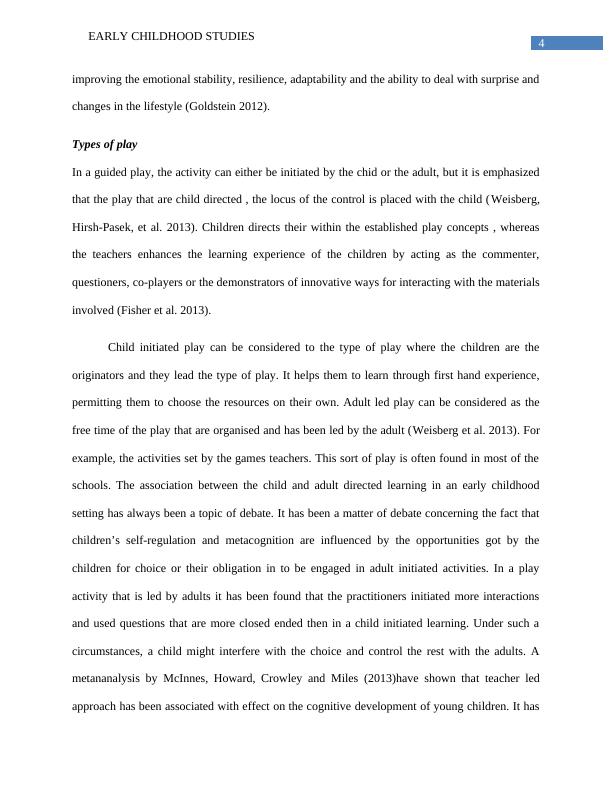
5
EARLY CHILDHOOD STUDIES
been stated by MOHANTY (2014) that more time in a child initiated play and less time in the
whole class and teacher led activity has been associated with higher scores on the measures of
the process quality. It has been stated in several studies that adult directed activities can foster a
sense of cultural dependency on the teachers which can affect the development of the problem
solving and cooperative skills in children.
It has been stated by Robson(2016) that it is necessary to advocate a holistic, experiential
and play based approach to learning for children within the age range six to seven years. The
concept mainly focused on the centrality of the child and the personal choice in the personal,
social and the emotional wellbeing of the child. It has been emphasised that there has to be a
balance between the practitioner-led and child initiated play. It has been noted in researches that
child initiated learning has always had a positive influence on children who had been considered
as “underachieving” in a classroom setting. Shy children have often found to be more confident
and calmer and possess the capacity of becoming future leaders (Maynard, Waters and Clement
2013).
The role of the adults in supporting play
Society should seek all the opportunity to support people. Play is so important to all the
children in the development of their social, mental ad creative skills that a society should seek
every opportunity to seek it. The critical role of the adults during the play includes facilitation,
individualization and engagement at the developmental level of each children. It has been stated
by Mannion, Fenwick and Lynch(2013) that nature based excursion has been an important
teaching strategy in the environment. A study by () have proved that adult guided play has been
endorsed as the best practice for supporting the cognitive emotional and social development of
the children. It has been emphasised by (), that elders/ teachers or parents supports the
EARLY CHILDHOOD STUDIES
been stated by MOHANTY (2014) that more time in a child initiated play and less time in the
whole class and teacher led activity has been associated with higher scores on the measures of
the process quality. It has been stated in several studies that adult directed activities can foster a
sense of cultural dependency on the teachers which can affect the development of the problem
solving and cooperative skills in children.
It has been stated by Robson(2016) that it is necessary to advocate a holistic, experiential
and play based approach to learning for children within the age range six to seven years. The
concept mainly focused on the centrality of the child and the personal choice in the personal,
social and the emotional wellbeing of the child. It has been emphasised that there has to be a
balance between the practitioner-led and child initiated play. It has been noted in researches that
child initiated learning has always had a positive influence on children who had been considered
as “underachieving” in a classroom setting. Shy children have often found to be more confident
and calmer and possess the capacity of becoming future leaders (Maynard, Waters and Clement
2013).
The role of the adults in supporting play
Society should seek all the opportunity to support people. Play is so important to all the
children in the development of their social, mental ad creative skills that a society should seek
every opportunity to seek it. The critical role of the adults during the play includes facilitation,
individualization and engagement at the developmental level of each children. It has been stated
by Mannion, Fenwick and Lynch(2013) that nature based excursion has been an important
teaching strategy in the environment. A study by () have proved that adult guided play has been
endorsed as the best practice for supporting the cognitive emotional and social development of
the children. It has been emphasised by (), that elders/ teachers or parents supports the
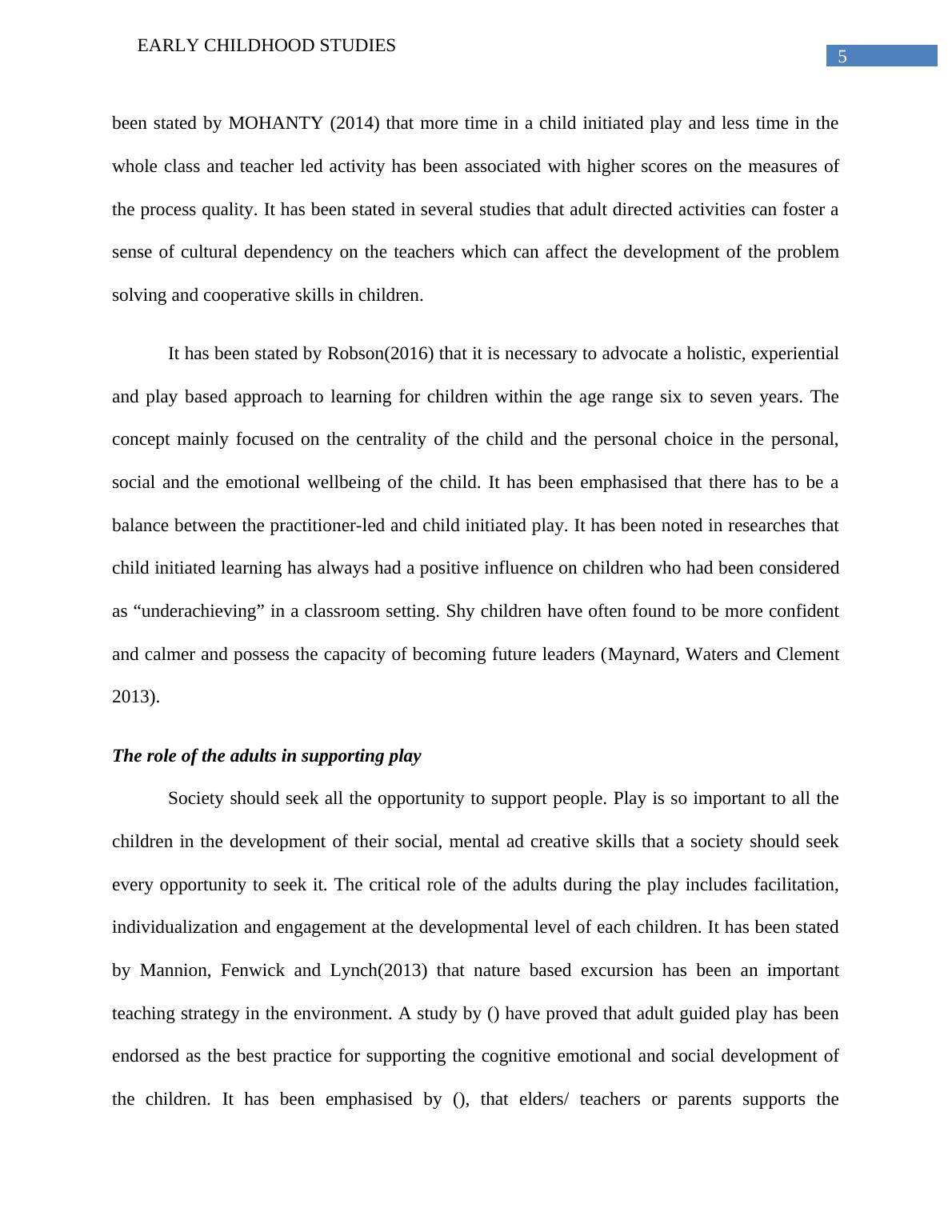
End of preview
Want to access all the pages? Upload your documents or become a member.
Related Documents
Importance of Early Childhood Education and Parental Involvementlg...
|17
|4443
|190
The Reggio Emilia Approach to Early Childhood Educationlg...
|4
|629
|216
Providing a Science Rich Environment in Early Childhoodlg...
|6
|1433
|481
Early Childhood Education and Care : Assignment PDFlg...
|14
|3924
|512
(PDF) Learning and development in early ageslg...
|10
|2306
|24
Early Childhood Education and Carelg...
|7
|2150
|180
